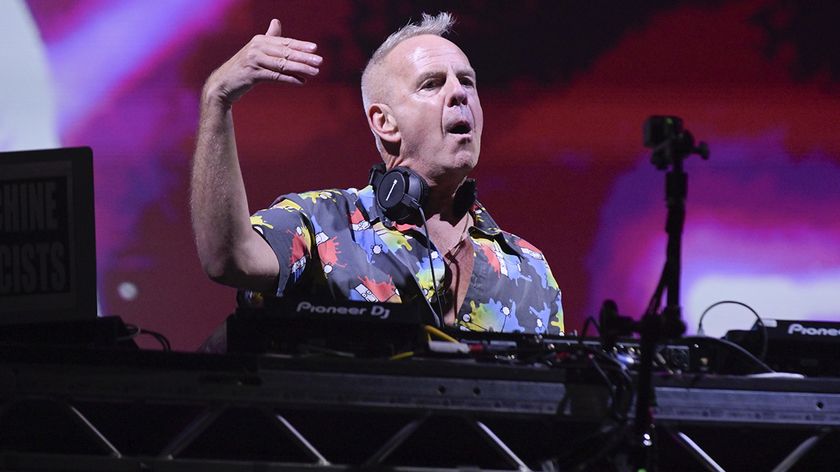
Stephen Merchant: the 10 records that changed my life
It’s hard to imagine that Stephen Merchant, having not only mastered but also having dominated multiple entertainment formats (radio, podcasts, stand-up, movies and TV), might have any artistic shortcomings. But the enterprising cultural phenomenon does admit to lacking one talent in his considerable creative skill set.
“I can’t play an instrument,” Merchant says. “I tried to learn much more belatedly but with no real success. By the point where I was interested in learning, in my 20s, I felt that I didn’t have the time and energy to commit to it. Not learning how to play music is one of the biggest regrets in my life, and I’m very jealous of people who can pick up a guitar or sit at the piano and play something.”
Before his fame skyrocketed with hit British sitcoms such as The Office and Extras (both of which he co-created with Ricky Gervais; the long-running US version of The Office was based on the original UK series), along with his recent HBO starring vehicle Hello Ladies, and before he launched a series of successful radio and podcasts shows (both with Gervais and solo), Merchant got his start by hosting his own comedy-and-music campus radio program, The Steve Show, at the University of Warwick. But while he characterizes himself as a “massive, deeply passionate music fan,” Merchant explains that he was somewhat late to the party.
“My parents never really listened to music,” he says. “It wasn’t because they disliked it – it wasn’t like the town in Footloose, where music’s banned or whatever. It just weirdly wasn’t on their radar. There was a record player in the house and a handful of albums – a Glenn Miller record and maybe something by ELO – but that was it. We never listened to music stations on the radio or watched music TV shows. It just wasn’t in the air.”
At the age of 14, Merchant discovered a pair of vinyl record albums at a school book sale his mother was working at (“somebody had left a couple of records along with a bunch of books they’d donated, and I poached them”) – one was The Beatles’ A Hard Days Night, the other was The Smiths’ Strangeways, Here We Come. “I’d heard of these bands in kind of the ether,” he says, “but it wasn’t till I got these records and sat down and listened to them that I really heard their music properly. In both cases, they we quite eye-opening.”
Recently, listeners to James Blake’s BBC Radio 1 show have speculated that an elusive guest who wields the handle DJ Badger may or may not be Merchant. Could be: He’s been at it for years, cutting his mix master teeth as a teenager at weddings and birthdays in his hometown of Bristol. “That’s how I’ve sort of been able to own music, by DJing,” Merchant says, “first at parties, and then later on the radio, hosting various shows. It’s been my way of distributing my musical tastes to people, and it’s a lot of fun.”
For more information on Hello Ladies and a guide to episodes, visit the show's official HBO site. On the following pages, Stephen Merchant runs down the 10 records that changed his life.

The Beatles - A Hard Day's Night (Original Motion Picture Soundtrack) (1964)
“I think I knew The Beatles at first from singing Yellow Submarine at school as a kid, so A Hard Day’s Night was my true introduction to their music. Just the sound of that opening chord – ‘schuuuunng!’ – it had this profound effect on me; it leapt out so unexpectedly and sent this tingle down my spine.
“The excitement that I felt must’ve been the way it was for people who first heard The Beatles in the ‘60s, yet I was discovering them in the ‘80s in my early teens. You hear something and it just jolts you and you go, ‘What the hell is this?’
“After being struck by A Hard Day’s Night, I became Beatles obsessed. I read all the books about them and bought all the albums, or I made copies of all their albums as one invariably did in those days – taping everything. I was as fascinated by The Beatles as I’m sure everybody else as been, but what was weird was how I discovered them almost by myself; they weren’t passed down by family or older brothers or anything.
“It’s very strange that The Beatles would have escaped my radar for so long. It’s as if I was living under a rock when it came to this music. But I caught up, thankfully.”

The Smiths - Strangeways, Here We Come (1987)
“This is the second of those two records I grabbed from the book sale. The Smiths had a similarly exciting appeal to me, much like The Beatles. What was different, though, was how The Beatles seemed a bit impersonal to me. Somebody once said something like ‘The Beatles are so ubiquitous that you listen to them like you would Beethoven.’ Like, this is 'quality music.'
“The Smiths got under my skin more when I was a teenager – the moping and the teenage-y angst of Morrissey’s lyrics struck me in a significant way. I’ve felt this way about a lot of music since, but this was the first time where it seemed as though the singer was singing directly to me – or about me. That's a pretty powerful feeling, thinking that only you and this singer can understand the world.
“The first song, A Rush And A Push And The Land Is Ours, has this electrifying opening; it sort of eases in slowly with this fade and then the guitars come crashing in. That had the same impact on me as the opening chord to A Hard Day’s Night. It just gets into your bones immediately. You hear it and you think, ‘This is so incredible. Why have I been deprived of this for so long?’”
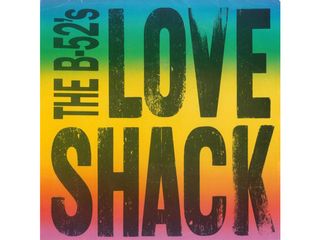
The B-52s - Love Shack (1989)
“This isn’t a song that I would necessarily listen to now, but it’s very meaningful to me as being emblematic of a certain time in my life. When I was first doing those wedding DJ gigs, and when I would go to other people’s parties – I was 16 or so – this song would get played, and the response to it was always amazing.
“It became a big party tune, not necessarily in a cool, hip nightclub way but in a more everyday way – people’s 18th birthdays and so on. There was a whole period before I went to university where so many of the best times I had with friends – we'd just goofing around at crappy house parties or shitty nightclubs, and this song would come on. People always loved it; it was so joyously silly.
“Love Shack is a beautifully put-together pop song, and it’s one of those things that can just make you feel happy and joyful no matter what. People probably feel the same way about Happy by Pharrell – it’s sort of boundless, almost bordering on the facile. So even though I might not play Love Shack now, whenever I do hear it, I have an enormous fondness for it.”
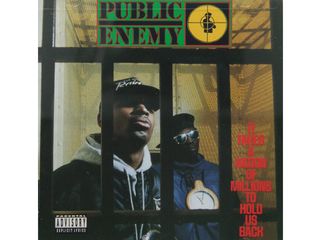
Public Enemy - It Takes A Nation Of Millions To Hold Us Back (1988)
“This is the first time that I became aware of hip-hop as a force. I first heard it in art class in school; we had a very liberal art teacher who would let people bring in music tapes and play them. Most people brought in things like Madonna and Prince or whatever, but one kid brought in Public Enemy.
“I had never heard anything like it. It seemed at the time so abrasive and different to me, like, ‘Who are these people?’ It felt so angry. I was a little bit scared, too – it felt like an insight into a darker world that I’d never experienced. I was really kind of unnerved by it, and I was shocked that the teacher allowed it to be played.
“It was also the first time that I realized how music could give voice to what was, to me, an alien world. What did I know about the black urban experience? I was living in Bristol in the suburbs, in the southwest of England; there was an inner city problem, but I wasn’t exposed to it. So it was very powerful to me to hear this music, and it took me a while to be brave enough to listen to it myself.
“I didn’t get fully into hip-hop until a bit later with the whole gangsta rap thing – I was big into Doggystyle and The Chronic – but for me, it was Public Enemy that put the genre on the map as a force. I’ve always been a fan of hip-hop, but I do feel slightly guilty about it, like I’m not allowed to like it the way that I do. It’s so clearly not my experience – what do I know about having a pack a Glock to go out? Nevertheless, it remains exciting music to me, particularly this album.”
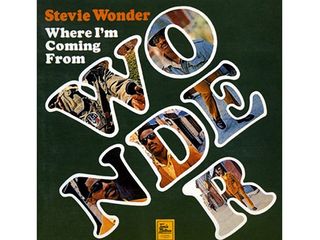
Stevie Wonder - Where I'm Coming From (1971)
“We had to do work experience as kids – you go find a local company that’ll let you work for free for a week. One place where I worked for a few days was at a radio station; it was Top 40 pop, but there were almost no DJs – the music had all been put on computer. It’s like they recorded a bunch of links, and the computer did all the rest. This wasn’t very eye-opening, actually, as far as music’s concerned.
“The other place I worked at was a library that had a music section – you could take out a record like you would a book. Because I didn’t have much music as a teenager, this was a great way to experiment with music. The one record I remember as being formative to me during this time was Stevie Wonder’s Where I’m Coming From – not one of Stevie’s more obvious albums, but because library didn’t have a really thorough collection, you’d wind up with these weird little offshoots of people’s catalogues.
“This is one of Stevie’s more explicitly political albums; it came out in 1971 and had the Vietnam war as a sort of backdrop. It’s him finding his way to that voice that he finally gets to on Innervisions and those classic ‘70s albums. Something about the record really struck me, and it opened up for me this whole world of R&B and funk.
“I remember Ricky and I were having a discussion once about musicians who can impact the heart, the hips and the head. There aren’t many who can do that – maybe Prince sometimes. Stevie is one of those people who, when he’s at his best, you want to dance to it, but it also has some meat to it as well. For a while I went down this funk road, and I listened to Bill Withers and Parliament or whatever, and that fed into my DJing at parties. But this Stevie album led the way.”

Woody Allen - Woody Allen (1964)
“Woody put out a couple of comedy albums in the ‘60s, and a compilation of them was made when I was in my late teens. I was always a big fan of comedy; I’d watch a lot of stand-up, and I’d see a bunch of comedy movies. This album I played religiously, to the point where I almost wore it away.
“I was hypnotized by the idea of someone who could be very funny but also very adult. This record had it all – sex and death and these existential ideas. As a teenager, I hadn’t heard comedians talk about that stuff, and even though it dates back to the early 1960s, it felt way more exciting than a lot of other comedy I was hearing at the time.
“It was surreal and anecdotal, and for me, it felt illicit to listen to it somehow, because it confronted these adult ideas. Later I discovered Richard Pryor, who is genuinely alternative and naughty and adult, but those Woody Allen stand-up routines are so elegant and well presented. Later, when I saw clips of him doing it, I couldn’t believe how nervous he looked – it was distracting. But on the records where you just hear his voice and the elegance of it, the character and the persona really come through – the slightly arrogant nerd.
“Much as I wanted to make movies and narrative things, one of the reasons why I wanted to do stand-up was because I felt as though I had to pay my dues as Woody Allen had. I read the stories about how he was crippled by nerves, and his managers would force him to go on stage. Slowly he built his act and established this whole thing, and then he turned his back on it down the road. But the sheer experience of making a roomful of people laugh is sort of vital when you then walk away from the live audience and you make movies or TV, which doesn’t have a live audience.”

Suede - Animal Nitrate (1993)
“With a lot of bands, I was late to the party, but this is the first time where I remember there was new band with a new record, and it was mine. I was right on the money.
“Suede had put out one or two singles, but this is the one that broke them through to the pop charts. For me, they were at the forefront of what became Britpop. Oasis and Blur and Pulp were all the big hitters, but Suede kicked the door open.
“When you listen to this now, it’s very clearly influenced by David Bowie and Roxy Music and that kind of thing. Again, it has the slow fade and these big crashing guitars come in, just like the Strangeways album. The lyrics have a slightly seedy, androgynous sexuality thing going on. In interviews, the lead singer would give these glib remarks, so you’d be like, ‘Is he gay? Is he bisexual?’ At the same time, the band had this strong backbone of good, crunchy guitars. It was sexy and swaggering, and I just remember rushing out and getting the seven-inch.
“When I met Ricky Gervais and started working with him, little did I know that he had been Suede’s manager for a handful of days before they became big. I think they'd fired him or he left managing before they broke through. But I think that he had at least sent their demo tape to the record label. So the single that meant so much to me was by the band that Ricky had managed.”

Oasis - Definitely Maybe (1995)
“Britpop didn’t really impact hugely in the States, but in England in the early ‘90s, bands like Blur and Oasis were our bands. I was away at university, and it was a really exciting time. Guitar music had been rejuvenated; it had been in the doldrums – in England, at least. In the States, there was Nirvana and the whole grunge thing, but we didn’t quite own that.
“I listen back now to a lot of it, and it’s not great stuff – some of it is mediocre – but at the time, there was a whole groundswell of excitement. Tony Blair was getting into power, long before he sort of disillusioned a lot of people, and he was inviting Oasis to tea at Number 10 Downing Street. There was a feeling that it was our scene: We’d missed punk and The Beatles and other things, so this was our moment.
“Oasis were like my discovery. I’d heard them on the radio doing their early sessions and bought their first records before anybody had ever heard of them. During my first few weeks at university, I heard that they were playing another university nearby, and so I persuaded two guys I didn’t know very well to come along, which they did but rather reluctantly.
“And Oasis were electrifying. They were so good in this tiny little room: Liam Gallagher, the frontman, was just cocky and confident and defiant; he stared the audience down, as if he were already a superstar. By the end of the night, my new friends were buying posters and T-shirts – I’d never seen people won over so quickly, during the course of a 45-minute set.
“This is one of the few times, maybe the only time, when I’d been there at the beginning of something. I’m including Definitely Maybe on the list, but what’s funny is, by the time the record came out, I’d slightly burned through my love for the band. You saw that everybody was into them, whereas you remember being there first. It kind of changes things.”
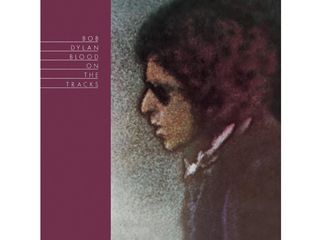
Bob Dylan - Blood On The Tracks (1975)
“I had gone through my Britpop phase. I think this was when I was working with Ricky at this alternative music station, XFM, in the early 2000s. I had stumbled across Bob Dylan somewhere. I liked him, but I always associated him with the ‘60s and thought of him as being political – Blowin’ In The Wind and vaguely protesting at things. Why do I want to hear a protest singer talking about the Vietnam War? It’s over – let it go.
“Then I listened to Blood On The Tracks and I thought, ‘OK, now I understand.’ The political messiah thing was just one moment in time, really – there’s so much more to him. To me, it’s like there’s Bob Dylan and then there’s everybody else. He exists in a stratosphere that is unequaled.
“This album is eminently re-listenable; in fact, I listen to it frequently, constantly, all the way through, all the time. There’s nothing on the list that I listen to as much. It came out during one of his divorces, I think, and it’s fueled by this anger. Idiot Wind has a sort of spiteful bitterness towards his ex-wife, and yet there’s other songs that are very romantic about love – If You See Her, Say Hello is a stand-out. As a personal testament and an expression of one man’s feelings, it’s unparalleled.
“This led me down a road of my love for singer-songwriters. I guess I felt more mature and I didn’t need the rock ‘n’ roll grit, and I could just listen to a man or woman with a guitar. Through Blood On The Tracks, I discovered Neil Young and Joni Mitchell and all that, which is the stuff I listen to most frequently now.”

Bruce Springsteen - Born To Run (1975)
“I have to give Ricky credit for turning me on to this. Through the singer-songwriter avenue, I’d bought this record – but I hated it. ‘What is this nonsense? This absolute, preposterous, overblown, Meatloaf-style, semi-operatic drivel?’ It was like a bad Broadway show. I put it away and said, ‘OK, I heard about him, I tried it, but I don’t get it.’”
“In my mind, Bruce Springsteen was like this Bon Jovi stadium-rock thing, very triumphant and pompous, the fist-in-the-air thing – ‘We’re Americans, fuck yeah!’ It just seemed like rabble-rousing stuff, Born In The USA and all that. I talked to Ricky about it, and he said, ‘You should listen again. I don’t think you quite got in tune with this.’
“I did go back and listen, and then it clicked – like a switch going off. I’m now one of the biggest Bruce Springsteen fans around. I adore the man. I see every concert I can and buy everything, read everything. I took my brother-in-law to a show – and he’d had the same feelings as I had – and it was a real bonding experience. Seeing Bruce live is one of those things you have to experience. He’s like a preacher – the way he works the crowd is like an evangelist.
“The more I listen to this album, the more meaning it has. It’s cinematic. I know that word gets thrown around a lot, but a song like Thunder Road is a movie in five minutes. You feel the lovers racing through the rain to be together before Clarence’s saxophone plays them off into the sunset. Bruce’s confidence to be personal and yet bombastic, to take all the rock ‘n’ roll staples and throw them at the audience, and to be able to write damning verdicts of the working struggle, with darkness and heartache… it’s remarkable.
“I read an interview with Nick Hornby in which he said, ‘Sometimes the reason why somebody is successful is because they’re so good,’ and that you don’t always have to pander to your audience. Bruce is a perfect example of that. You plough your furrow, and through sheer talent and showmanship, you become a legend. Bruce is a legend, and rightly so.”

Joe is a freelance journalist who has, over the past few decades, interviewed hundreds of guitarists for Guitar World, Guitar Player, MusicRadar and Classic Rock. He is also a former editor of Guitar World, contributing writer for Guitar Aficionado and VP of A&R for Island Records. He’s an enthusiastic guitarist, but he’s nowhere near the likes of the people he interviews. Surprisingly, his skills are more suited to the drums. If you need a drummer for your Beatles tribute band, look him up.

"Reggae is more freeform than the blues. But more important, reggae is for everyone": Bob Marley and the Wailers' Catch a Fire, track-by-track

“Part of a beautiful American tradition”: A music theory expert explains the country roots of Beyoncé’s Texas Hold ‘Em, and why it also owes a debt to the blues

"Reggae is more freeform than the blues. But more important, reggae is for everyone": Bob Marley and the Wailers' Catch a Fire, track-by-track

“Part of a beautiful American tradition”: A music theory expert explains the country roots of Beyoncé’s Texas Hold ‘Em, and why it also owes a debt to the blues







